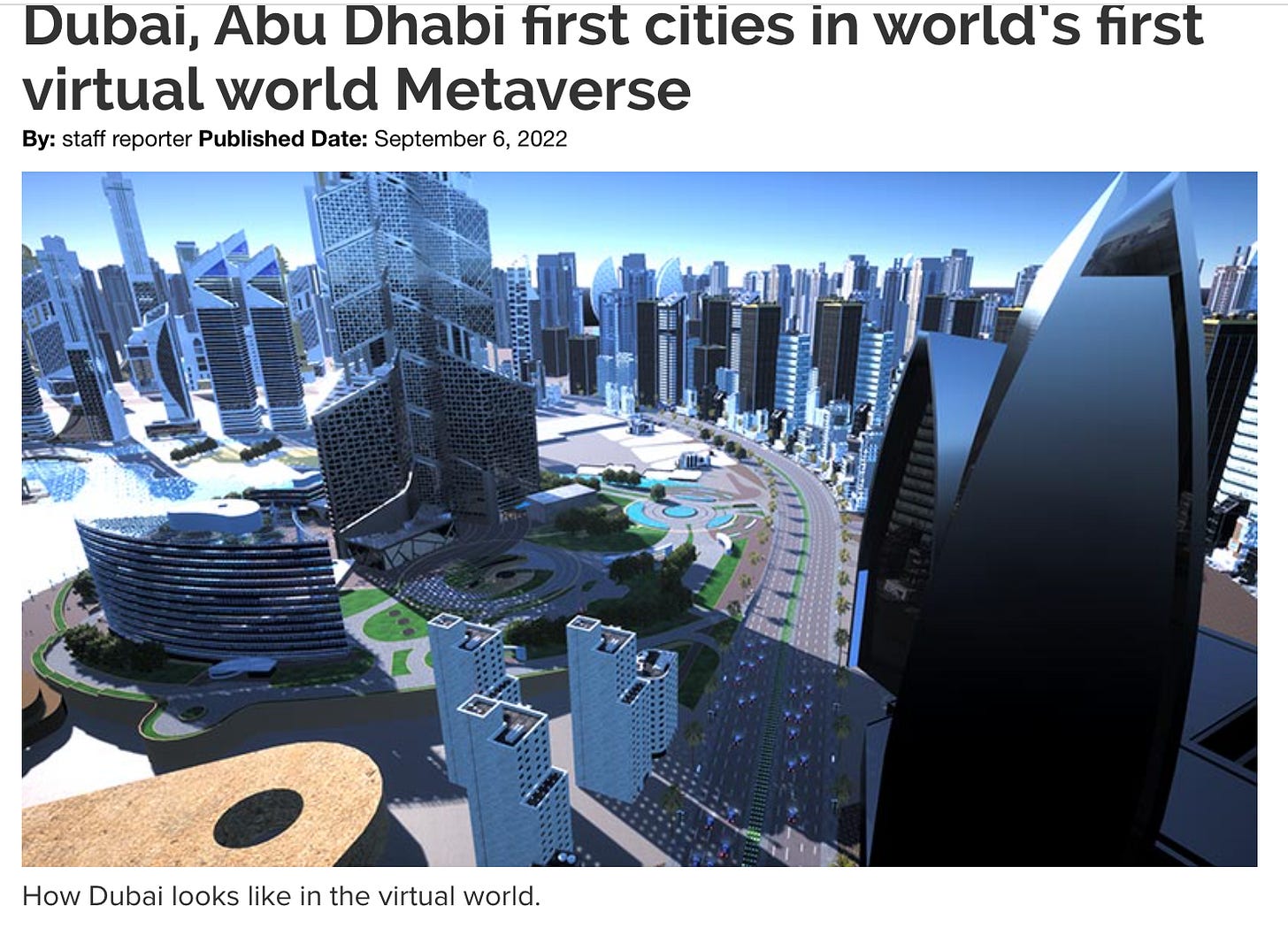Dubai and the "sovereign individual"
Where the smart money goes matters
Many eyes around the world are on Dubai this week, a place that is a case study in profitable business practices unburdened by messy, ragged democracy. Dubai is home to a florid variety of zones focused on attracting investment, including Dubai Healthcare City and Dubai Media City, and more than 90 percent of the private sector employees in Dubai are migrant workers who don’t vote. (Citizens there don’t really vote either.) I'm sure the Dubai Expo City facilities for the COP28 conference are gleaming, well air-conditioned, and enormous. They probably look a bit like virtual worlds.
The harmony isn't merely visual: There is a strong link between the cyber world and the popularity of Dubai's zones that's worth understanding. This link, in turn, connects to the uphill battle faced by anyone hoping that large-scale climate adaptation will become a focus of public attention or funding, much less action.
First, some background. One idea animating the youthful internet, the place of John Perry Barlow's "Declaration of Independence of Cyberspace," was aspirational—a "new home of the Mind," a place where the better angels of our natures would have an opportunity for expression unconstrained by geography or status. World community. Freedom to connect. That kind of thing.
From the start, this mindset included some clearly libertarian threads. I remember lots of talk about "competition among rulesets" in the late 1990s. We'd all be choosing our groups intentionally, imagining our communities, finding our tribes, online. The social contract? It would be a real contract, to which people would knowingly and happily agree, signing up in exchange for benefits (vague) that were bound to arrive as all connected to all.
In the nearly 30 years since then, the notion of escaping national constraints in order to sign up to something better online—leveling up, being better civic actors—has both changed its appearance and migrated decidedly into the offline world.
The work of providing social safety nets, taxes, infrastructure, care for the elderly and the infirm, and public education—traditionally the domain of democratic nations—can be expensive. Why would clever global citizens ever sign up to bear the burden of paying to remedy the deficits of others? It seemed to serve the economic interests of the traveling class, the investors, for the entire idea of territorial democratic governments to become hopelessly old-fashioned.
In fact, there's a a central text for this cyberish worldview that came out in 1997 and was re-issued in 2020 with an introduction by Peter Thiel. It's called The Sovereign Individual: Mastering the Transition to the Information Age. The book's original subtitle was "How to Survive and Thrive During the Collapse of the Welfare State." Here's a quote:
[M]icrotechnology will make it technically feasible for individuals to escape from the burdens of subordinate citizenship. They will be extranational sovereigns over themselves, not subjects, in the new 'Virtual City,' owing allegiance by contract or private treaty in a fashion more reminiscent of premodern Europe, where merchants secured commercial treaties and charters to protect themselves from arbitrary seizures of property....
This was familiar stuff in the 90s. Internet enthusiasts talked then about the Hanseatic League operating online and joked about the ineptness of Congress. The idea of people or corporations being based digitally in Estonia (or Vermont) for business purposes was appealing. Members of the largely homogenous world of the early internet engineers, computer science grad students in California and people like them, were focused on social justice of a kind—but it was a conversational kind that would work for them.
Here's the historical perspective of the authors of The Sovereign Individual in a nutshell:
The nation-state facilitated systematic, territorially based predation. Unlike the situation faced by hunter-gatherers in the Stone Age, the main parasite and predator upon the individual at the end of the twentieth century was not likely to be the "outsider," the foreign enemy, but rather the presumed embodiment of the "in-group," the local nation-state itself.
How about that? Democratic nations are historically predators because they exact taxes that pay for public goods like education, clean water and air, and basic infrastructure. And it is only smart for "the new cosmopolitan elite of the Information Age" to opt out. The authors of The Sovereign Individual predicted that as the enlightened left in droves, nations would gradually become irrelevant. They did warn their readers to watch out for conflicts ahead with the "information-poor," the rest of humankind, who "are largely monoglot and do not excel in problem-solving":
These 'losers' or 'left-behinds' ... will no doubt continue to identify their well-being with the political life of existing nation-states.....They will lose income because they will no longer be able to depend upon political compulsion to pick the pockets of persons more productive than themselves.
There's so much more of this kind of language in The Sovereign Individual. It's a complete worldview. All clever humans will leave high-tax countries; cities that hope to remain competitive will need to become high-value, low-tax storage units; conflict will erupt as the left-behind, the parasites, complain.
On the internet side of this discussion, "choices of rule-sets" were combined over the years with unrestricted amalgamations of businesses and amplified by network effects to create giant, privatized platforms. That hadn't been the idealists' plan, perhaps, but that's how things worked out in the absence of effective public sector intervention.
In the offline world, cyber-libertarianism has found its expression in a wide variety of free-trade zones across the globe. Interested in living forever, as many in that crowd are? Peter Thiel and Marc Andreessen are investing in Próspera, a Zone for Employment and Economic Development (ZEDE) carved out of Honduras on the island of Roatán, where a biotech startup called Minicircle is paying clinical trial participants in cryptocurrency for testing out longevity gene therapies. No nation is overseeing this testing; Próspera says they "avoid onerous prescriptive regulation in favor of closely monitored self-regulation."
There are thousands of stories like this, including many in Dubai.
In an important sense, though, when it comes to climate there is one story: Smart money, modern money, likely thinks it is not its responsibility to ensure humankind thrives as the climate changes rapidly in the years to come. Profitable climate mitigation innovations to sell to humankind? Worthwhile. That's "problem-solving." Adaptation? That's someone else's problem.




